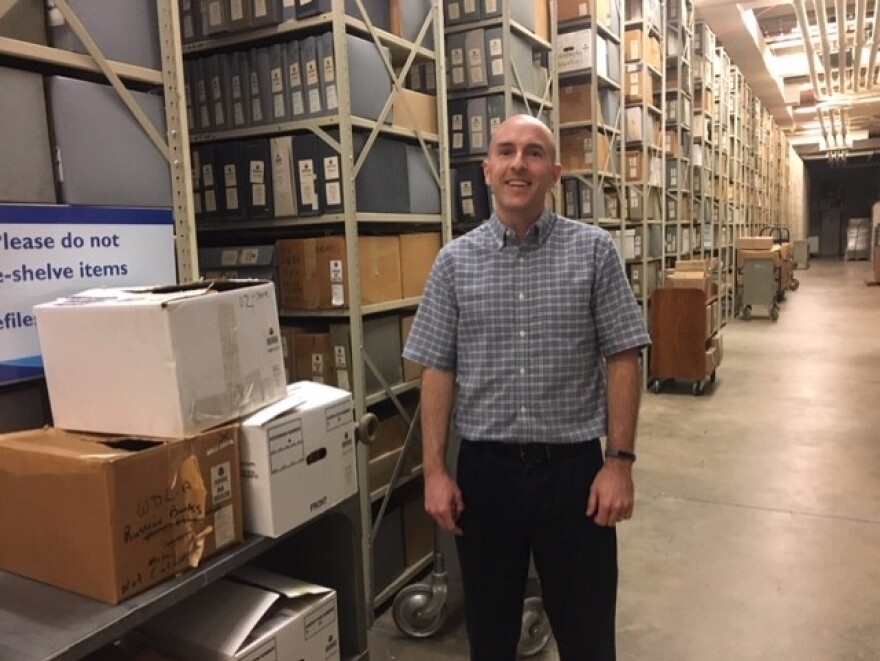Climate change is getting lots of attention on the 2020 campaign trail. Among the popular slogans - "12 years to fix the climate". It appears on signs and in speeches, but what does it really mean? BPR’s Helen Chickering met with the science editor who worked on the report that launched the catch phrase.
The world’s largest environmental data archive is in a basement in downtown Asheville – a really big basement.
“Folks walk by this building every day and don't really know what's in it. “

That’s Jason Cooper, the building is the Federal Building, and the basement is his workspace. Cooper is an archivist at NCEI, The National Centers for Environmental Information, part of NOAA, the National Oceanic and Atmospheric Administration.
“If you can imagine 32,000 boxes of paper,” says Jason Cooper, “we have over 125,000 reels of microfilm next door. We have data from 1735 until last month. So it really represents a very long time period. Some of our oldest data are from before the instrumental record exists. In other words, no thermometers, no rain gauges, no wind vane. So it's folks saying maybe on a certain day it was breezy or we had a frost or the Lake froze over. So there are clues in there as to what the weather was, even if it's not from an instrument.”
Today thanks to satellite, radar and other technology, NOAA collects more than 3.5 billion weather observations from around the world – every day. Data that a team of NOAA scientists and experts use to monitor the climate. Their findings often make headlines, like this report featured on NPR’s All Things Considered,
ATC: Deke Arndt works forecasting at NOAA he says hotter temperatures are making droughts more severe, “A warmer atmosphere is a thirstier atmosphere”
NOAA experts also collaborate with climate scientists around the world, including the United Nation’s Intergovernmental Panel on Climate Change or IPCC. In 2018 the IPCC issued a special report titled Global Warming of 1.5 Celsius which triggered slogans and calls to action from climate activists and politicians that are still heard today.
( Rep. Alexandria Ocasio-Cortez) “and we’re like the world is going to end if we don’t climate change.”
(Deocratic. Presidential Candidate Bernie Sanders) “What scientific community has told us is we have all of 12 years to transform our energy system away from fossil fuel.”
(Climate Activist, Greta Thunberg) “We are 12 years away from not being able to undo our mistakes.”
So where did the “We have 12, years (which is 10, now that is it 2020) to fix the climate come from and what does it really mean?
“So by way of background”

That’s Tom Maycock. He was the science editor of the 2018 IPCC special report. His office is just upstairs from the basement Archives. Maycock, works for the North Carolina Institute for Climate Studies, which is funded in part by NOAA, says the origins of the 2030 or bust catchphrase can be traced back to the 2015 Paris agreement
“As part of the Paris agreement, in 2015, the IPCC was asked to produce a report on 1.5 degrees Celsius of global warming, “says Maycock. “So 1.5 C degrees warmer than preindustrial conditions. What are the impacts? How do those impacts compare to two degrees°C of warming, which is sort of the original Paris target and can, can we limit warming to two degrees or 1.5 °Cand if so, how do we get there. One of the conclusions was that to limit warming to 1.5 degrees °C we'd have to cut emissions about half, 45% by 2030 and bring emissions to zero by 2050 to get to two degrees - benchmark was kind of in there. (3:00)The short version of that is we have about 12 years to cut emissions in half if we want to stay under 1.5 degrees °C.”
“The report got a ton of media attention,” notes Maycock.
And there was one story in particular, says Maycock. It came from the British newspaper The Guardian. Maycock says the article was a pretty fair assessment of the findings. But...

But the headline says, “We have 12 years to limit the climate change catastrophe, um, which is a little different implication. And so you hear this framed a lot of different ways. You hear people echo this idea of we have 12 years or we're doomed or it's going to be a catastrophe. And that is not at all what the science is telling us. Things are definitely worse at 1.5°C than they are at one and certainly at two degrees than more so than 1.5. °C, but it's not that we fall off a cliff at any of these temperature thresholds. It's not the end of the world.
Maycock adds that a sense of urgency is justified to avoid the more serious risks expected at higher levels of warming detailed in the report, including more intense heat waves, drought, heavy precipitation, sea level rise which will impact everything from coral reef ecosystems to human health.
“I think it's helpful that people are concerned. I think that was a message of the report is you should be concerned and that urgent action would be required if you want to avoid these more severe impacts at higher degrees of warming. I think the crucial question is which part of that message stuck? You know, if it is - we have a very short amount of time to act if we want to achieve these goals - that's a correct interpretation of the scientific message. If it's, we only have a few years or we're doomed, that's not a correct interpretation of the science.”
And his hope, that people embrace the science and the seriousness of the 2030 message, without mischaracterizing the carbon reduction timeline as a deadline for climate catastrophe.
I’m Helen Chickering, BPR News.



